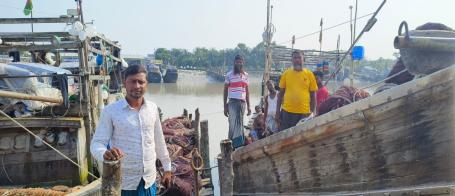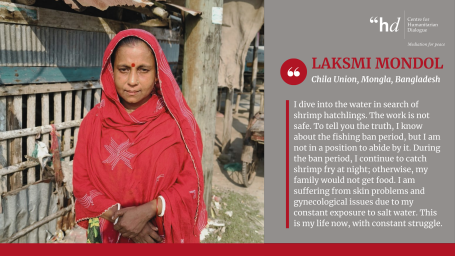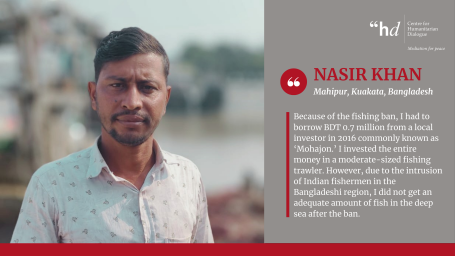Voices from the Bay - Making a fishing ban work in the Bay of Bengal

Fisheries are a cornerstone of livelihoods in the Bay of Bengal, sustaining millions of people who depend on marine resources for their income and food security. However, fish stocks in the region are rapidly depleting due to overexploitation, illegal, unreported, and unregulated (IUU) fishing, and the far-reaching effects of climate change. These unsustainable fishing practices, lack of oversight and weak enforcement create challenges for fish stock management in the region. Additionally, the effects of climate change, including rising sea temperatures and frequent extreme weather events, have ecological repercussions that can cascade into direct challenges for fisheries. Competition for dwindling fish stocks can exacerbate existing tensions within coastal communities and between nations, potentially leading to conflicts over access to marine resources.
In response to these pressing challenges, countries like Bangladesh and India have implemented fishing bans to protect and replenish the declining fish stocks. While these measures are designed to restore marine resources, they also impact the communities that rely heavily on fisheries, highlighting the complex balance between conservation efforts and the livelihoods of coastal populations.
The Bay of Bengal Maritime Dialogue serves to address these challenges by fostering regional cooperation and developing comprehensive strategies and action plans to enhance effective enforcement and regional policymaking, drawing on insights from local realities to ensure more sustainable and impactful solutions.
In partnership with local researchers, the Centre for Humanitarian Dialogue (HD) has collected firsthand accounts from fisher folk affected by these challenges. Fisher folk have shared their stories about the impacts of seasonal fishing bans on their livelihoods, humanitarian concerns, and the challenges posed by IUU fishing. By gathering these invaluable community viewpoints, the research provides robust evidence to inform policy options that the littoral states (Sri Lanka, India, Bangladesh, Myanmar, Thailand, Malaysia and Indonesia) can implement to mitigate further environmental degradation. These findings contribute to addressing the lack of evidence on the effectiveness of policies implemented by countries as well as provide concrete recommendations to local, national and regional decision-makers and the wider policymaking community within and beyond the region.

In Bangladesh, HD’s field research shows that the seasonal fishing ban in the country received mixed reactions from local communities, with 86.67% supporting the 22-day ban but only 5% backing the longer 65-day ban. The primary concern for the local communities is the severe disruption to their livelihoods, as many rely solely on daily fishing for income, and the threat to their food security, as the ban limits their access to essential food sources. This has led to greater opposition to longer bans that exacerbate these challenges. The ban's effectiveness is hindered by issues such as insufficient compensation and illegal fishing by fishers from neighbouring countries. To be effective, a fishing ban should ideally involve stringent enforcement to eliminate IUU fishing, provide adequate compensation to affected communities, and include mechanisms to ensure that it leads to noticeable improvements in fish stocks without causing undue hardship.

Many fishers in Bangladesh (81.7%) take the view that IUU fishing by neighboring countries hinders the ban’s implementation. To ensure the effectiveness of the fishing ban, a large majority of fishers surveyed are in favour of a coordinated fishing ban between Bangladesh and India, which can help prevent IUU fishing, enhance sustainable fisheries management and promote bilateral cooperation.
We believe that integrating community perspectives into regional policymaking not only enhances the legitimacy of decisions but also ensures that our strategies for marine environmental protection and maritime security are both effective and sustainable.
Nicholas Chu, Centre for Humanitarian Dialogue
In 2024, HD facilitated the Fourth Bay of Bengal Maritime Dialogue which convened high-level officials, heads of regional organisations, and representatives from prominent think tanks from the littoral states of the Bay of Bengal. Based on the lessons learned in Bangladesh, the participants recognised the need for a cohesive and synchronised regional management framework on fisheries. Recognising the necessity of data collection and evidence gathering to make sound policies, the littoral states continued to support ideas to advance marine scientific cooperation, including supporting a new marine research network and potential fisheries-focused joint research missions. This milestone highlights the need and potential for community voices in policymaking at the regional level, ensuring that decisions are grounded in local realities and responsive to the diverse needs of coastal communities across the Bay of Bengal.
This impact story was prepared by: Sreejith Sugunan, Nicholas Chu, Sebastian Kratzer, Lina Hillert (Centre for Humanitarian Dialogue), Sinéad Barry and Alexandra Steinkraus (adelphi research)
Special thanks to Moutusi Islam for her invaluable role in conducting the interviews and her dedicated research efforts.
Share on

